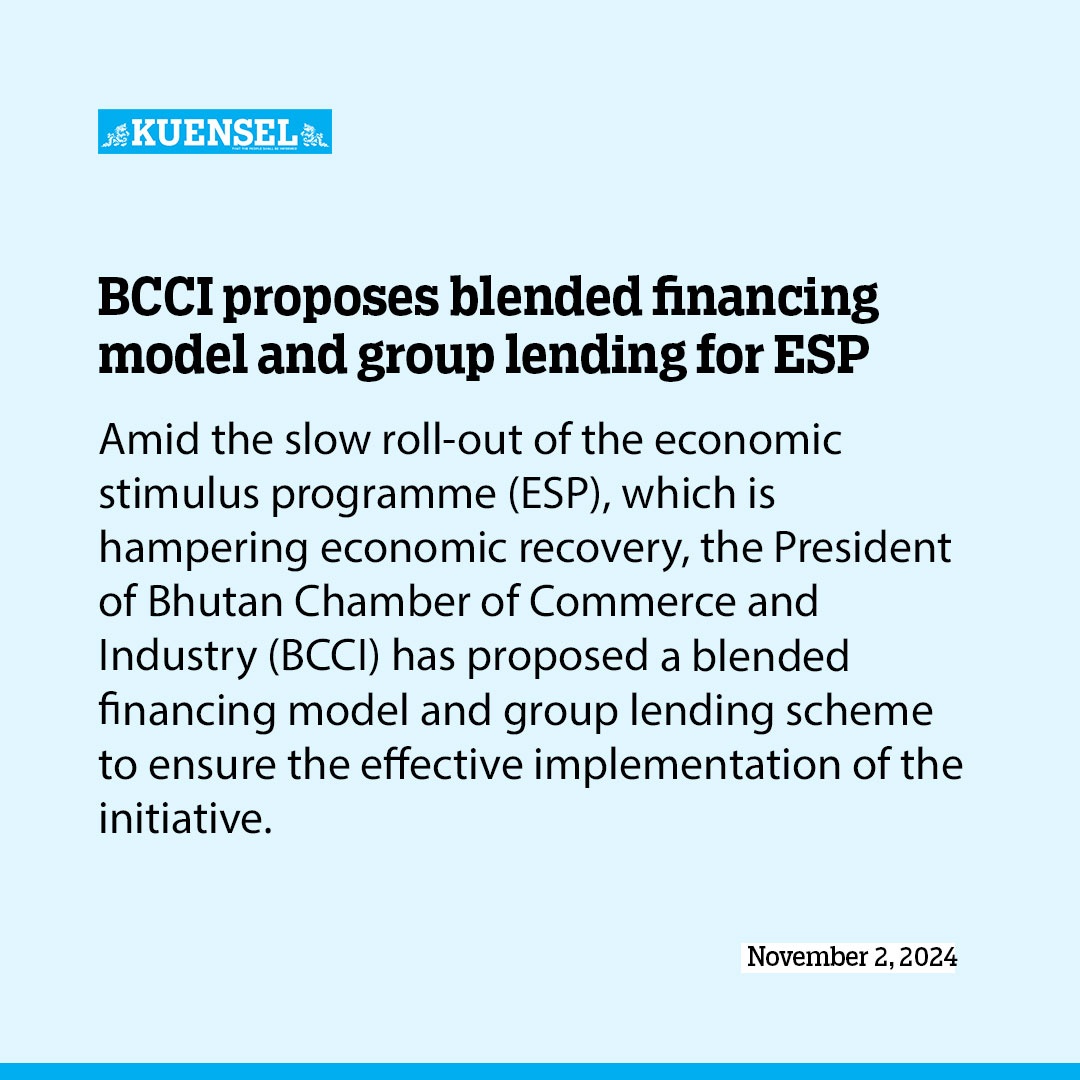Economists say that with banks playing safe, slowing disbursement process, the intended economic growth is not likely to be achieved
Thukten Zangpo
Amid the slow roll-out of the economic stimulus programme (ESP), which is hampering economic recovery, the President of Bhutan Chamber of Commerce and Industry (BCCI) has proposed a blended financing model and group lending scheme to ensure the effective implementation of the initiative.
The ESP includes financial injection of Nu 5.3 billion into the banking sector, divided into two distinct funding windows for economic recovery. The first window includes Nu 3.3 billion for concessional credit lines and the second window includes Nu 2 billion reinvigoration fund.
BCCI President Tandy Wangchuk voiced concerns about the ESP implementation, stating that the current disbursement of loans primarily benefits a select few borrowers.
“The private sector was not consulted,” he said. “We could have played a vital role in ensuring the effective use of ESP funds, especially considering the lessons learned from past high non-performing loans (NPLs).”
He added that the existing ESP places the full responsibility for lending on banks at reduced interest rates, which introduces risks and ultimately limits access to finance.
The BCCI President proposed a blended financing model that combines government funds with bank liquidity to facilitate easier access to credit.
“If finance is accessible through this model, there is no need to disrupt the normal loan assessment procedures, including interest rates,” he said, suggesting that up to Nu 3 billion could be injected under this approach.
To mitigate the risk of NPLs, Tandy Wangchuk recommended introducing a requirement for collateral valued at 50 percent of the loan amount.
“Suppose a person wants to start a production and manufacturing unit but struggles to secure a loan from a bank due to concerns about high-risk lending,” he said. “Under the blended finance model, government funds and bank liquidity are combined to facilitate easier access to credit for businesses. In this setup, government funds serve to lower the banks’ risk exposure.”
The government can offer a guarantee to banks, promising to cover a portion of any losses incurred from loan defaults. This assurance, he said, will encourage banks to lend to businesses, even when the loans are deemed high-risk.
Tandy Wangchuk also proposed a group lending scheme under the ESP, through which a collective of individuals can apply for a loan and share the responsibility for repayment.
This scheme, he said, could benefit various sectors, including agriculture, small and medium enterprises, and cottage industries. “Businesses affected by COVID-19, which do not meet the current ESP criteria, should be supported through this initiative.”
He said that the government should consider implementing the group lending scheme, particularly for businesses in eastern, central, and southern Bhutan, which often face greater challenges in accessing finance.
In addition, he said that while the government has initiated efforts to promote agriculture, the loan limit of Nu 1 million for this sector is insufficient to meet the needs of aspiring farmers and agribusinesses.
An economist said that the ESP is progressing as intended, emphasising that it is designed not to finance everyone in need but to support entrepreneurs with viable ideas who lack funding. “It’s meant for entrepreneurs who have ideas but lack funds.”
He said that many individuals are refraining from taking loans from banks, instead waiting for the ESP loans since the announcement. “This creates a moral hazard stemming from government intervention in the market,” he added.
According to the Royal Monetary Authority, credit from financial institutions rose to Nu 238.93 billion as of August this year, up from Nu 227.68 billion in January.
An economist, Damber Kharka, said that while the ESP aims to stimulate economic growth in specific sectors through low-cost financing, its implementation has been sluggish.
He pointed out that the banks must assess the risks associated with lending, especially since certain ESP loans do not require collateral. He cautioned that banks should ensure ESP implementation does not lead to a surge in NPLs later while stressing the importance of setting a reasonable timeline for fund disbursement.
“If banks play safe and the disbursement process continues at the current rate, then the intended economic growth is not likely to be achieved. Disbursement that happens at an unnoticeable rate taking a long time period fails to produce any economic impact,” he added.
An entrepreneur said that the government could have consulted the private sector and specific industries for smooth implementation of the ESP. “There is confusion among the public, with many believing that the ESP is available to everyone. The government’s intended target for the ESP is diluted by poor communication,” he said.
He said that the ESP should focus on small priority sectors and businesses that generate jobs. Currently, about 90 percent of Bhutan’s private sector is service-oriented, which is ineligible for the ESP, while production and manufacturing make up only 5 percent.
The entrepreneur stressed the importance of the service sector, which adds value to products, including IT and industry-related services. He highlighted that launching a production and manufacturing venture is costly due to regulatory processes and the need for technical expertise and investment.
Another entrepreneur said that the ESP should not merely provide opportunities for youth but should target highly scalable businesses and entrepreneurial solutions. “Businesses and entrepreneurship are different because giving loans does not create entrepreneurs as they are problem solvers and not money lenders.”
He added that large-scale investments in production and manufacturing alone are unlikely to stimulate the economy effectively, given Bhutan’s unique context.
He proposed the establishment of credit rating agencies similar to those abroad, which could underwrite loans and mitigate risks for banks by taking responsibility if businesses fail.
He said that since the economy is in a bad situation, spending in the government-oriented programmes through ESP is not viable as it would not create a resilient economy.


